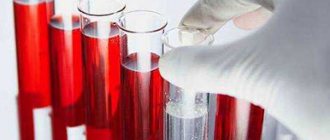How to take a prolactin test correctly?
Due to some diseases, hormonal levels are disrupted, so the doctor advises taking a prolactin test to diagnose the pathology and subsequent therapeutic measures. So, before donating blood to check the concentration of prolactin levels in the blood, patients come to the doctor with the following complaints:
- discharge from the mammary glands not associated with lactation - in both women and men;
- discomfort, pain in the chest;
- diseases of the reproductive organs of a chronic type;
- infertility;
- problems with lactation;
- menstrual disorder;
- rapid weight gain;
- impotence;
- decreased sexual desire;
- severe menopausal symptoms.
If the patients are women, then discomfort and disorders are not determined by what day of the menstrual cycle.
The test for prolactin concentration should be taken in the morning on an empty stomach. Many people wonder on what day of the cycle to take a prolactin test, but there is no difference, because during the menstrual cycle the content of prolactin in the blood is the same. The exception is the days before, after and during ovulation - then the level of prolactin increases slightly.
Often, an obstetrician-gynecologist or endocrinologist prescribes a prolactin test on days 3–5 of the menstrual cycle. This is interpreted by the fact that these days it is also necessary to take female hormones - follicle-stimulating, luteinizing and thyroid hormone - thyroid-stimulating. FSH, LH, TSH are taken along with prolactin for a general picture of hormonal levels.
There are other rules for which day of the cycle to take prolactin, depending on several situations:
- When taking birth control pills, prolactin can be taken on any day of the cycle.
- If a woman is breastfeeding, it is necessary to agree with the doctor on which day of the cycle to take prolactin. Before taking the test, you must stop lactation and not feed for at least 7 days.
- During the period of bearing a child, it does not matter what day to take prolactin.
Before you go to take a prolactin test, prepare for this process, because not only the day of your cycle is important.
Preparation for analysis involves:
- prolactin is taken strictly on an empty stomach in the morning: it is forbidden to drink tea, coffee, you should also abstain from cigarettes and alcohol;
- Before you go to get tested, avoid heavy physical activity, intimacy, and heavy protein foods. Remember that the last meal should take place 8 hours before going for the test;
- do not abuse thermal procedures: 3 days before you go to take the test, do not visit the bathhouse, sauna, refuse to take a hot bath;
- try not to be nervous and avoid stressful situations and overwork;
- try to ensure that the night before the test is a good night's sleep and lasts at least 7–8 hours;
- in case of viral or infectious diseases, postpone the test - illnesses contribute to an increase in hormonal levels regardless of what day of the cycle, so postpone the test to another day;
- when you come to the laboratory to take the test, do not go straight into the office - take a breath, calm down - the level of prolactin in the blood will be as accurate as possible.
How to donate blood for prolactin? An important question, since this analysis is very complex. It must be taken in the morning and on an empty stomach. Previously, a day before the test, avoid sexual activity, drinking alcoholic beverages, smoking, not playing sports and other physical activities, and also not taking a hot bath or visiting a sauna.
A prolactin test should be done in the first 3–5 days from the onset of menstruation or on days 23–26 with a 29-day menstrual cycle. This is important information that answers the question - what you need to know about how to take prolactin correctly.
Is treatment required after prolactin tests?
Prolactin in polycystic disease
And another recommendation about prolactin - when is the best time to take it. A good mood and loose clothing are encouraged. These are the features before taking the test, which, by the way, is best done three hours after you wake up.
A prolactin test is done for certain indications:
- infertility of unknown origin (conception does not occur for more than 1 year);
- in case of suspicion of the presence of a tumor disease;
- cyclical pain in the mammary gland;
- secretion of milk from the mammary glands outside the feeding period;
- lactation disturbance;
- osteoporosis;
- lack of ovulation.
Prolactin and menstruation can coexist at the end of the lactation period. The fact is that while the baby is feeding, the nipple is stimulated, which can activate the production of prolactin. Regular breastfeeding is believed to suppress ovulation. But some girls, even with this regimen, may experience menstruation, which is not a pathology.
On what day should I take this hormone? Before taking a prolactin test, you should consult your doctor. In general, its concentration varies little depending on the days of the menstrual cycle, but the level in the second phase (luteal) is slightly higher than in the first (follicular).
The period when you can take a prolactin test is not limited to the days of the menstrual cycle and you can donate blood for testing at any convenient time, following all the necessary preparation rules.
Since this hormone has a cyclical type of secretion, you need to take a prolactin test early in the morning, from 8 to 11 o’clock, no later than 3 hours after sleep.
To clarify the diagnosis, tests of other sex hormones may sometimes be required. In clinical practice, a combination of tests is often used: sex hormone binding globulin (SHBG), FSH, LH, progesterone, estradiol. And these additional tests must be taken on certain days of the cycle to avoid false results.
Preparation
Despite the fact that this sexual hubbub can be taken on any day of the cycle, there are many requirements to obtain an accurate result. Preparation for the test includes avoiding excessive physical and emotional stress, as well as sexual intercourse one day before the planned examination.
The hormone is a stress hormone, the concentration of which can increase with increased stress, mental trauma, exposure to adverse weather conditions, sudden changes in time zones, etc.
Taking certain medications, such as antihistamines, antipsychotics, oral contraceptives, antidepressants, verapamil, metoclopramide, bromocriptine, etc., may cause changes in the concentration of the hormone. Therefore, a prolactin blood test should be taken after stopping these drugs. Occasionally, blood testing for prolactin may be necessary to monitor dosage during therapy with these medications.
The day before the test, you should give up protein foods and alcoholic drinks, and it is optimal to take an easily digestible vegetable dinner. A blood test for prolactin should be taken 10-14 hours after the last meal. You need to go to bed early enough so that your sleep duration is at least 7–8 hours.
On the day of the study
On the chosen day, you need to take prolactin in the morning. If the time for donating the hormone was missed, it is better to refuse to visit the laboratory on that day.
It is necessary to take prolactin correctly on an empty stomach and avoid drinking tea and coffee. If necessary, you can drink a few sips of clean water. Upon arrival at the laboratory, the patient should rest and relax for at least 15 minutes.
It is very important not to smoke, as nicotine can trigger the release of hormonal substances. Also, you should not wear very tight or uncomfortable underwear, so as not to further stimulate your breasts.
The laboratory must report the day of the menstrual cycle. This will help you choose the standard of analysis that corresponds to the hormonal period of a girl or woman.
Prolactin is a lactotropic protein. The hormone is produced in the anterior part of the pituitary gland. Its normal content plays a big role for the health of men and women. Prolactin affects the body's defense system, takes part in the preservation of water and electrolyte balance, and reacts with proteins of the endocrine organs.
The main role of the hormone is participation in the reproductive function of the body. High prolactin content promotes milk production in nursing mothers.
At the age of 12-14, thanks to prolactin, girls begin to develop mammary glands. Protein is involved in ensuring a regular menstrual cycle and ovulation. Blood testing for prolactin allows you to determine an increased amount of protein, which prevents conception.
They take the test early in the morning at 7 o'clock. Sometimes blood is taken in the laboratory between 8.30-10.00 am. To properly take a hemolymph test for women, the patient needs to wake up early in the morning a few hours before the test. They prepare for the analysis in advance, and it is not recommended to brush your teeth before the procedure.
Key indications
You need to donate blood for prolactin when there are a number of characteristic changes that occur in the body. The key ones include:
- Unreasonable swelling of the breast, accompanied by severe pain.
- Galactorrhea is the release of milk from the nipples that occurs outside of pregnancy and lactation.
- Lack of milk after childbirth.
- Formation of nodules in the breast tissue (mastopathy).
Another category of problems for which it would be good to check the hormone prolactin are problems directly related to reproductive function. These may include the following:
- Problems with conceiving a child.
- Decreased libido and problems with orgasms.
- Insufficiently regular menstrual cycle.
- Numerous miscarriages.
- Excessively long pregnancy process.
- Hair growth similar to that of men.
We also recommend viewing: Causes of elevated prolactin in women
How to maintain normal prolactin levels?
In order to prevent any deviations, you need to listen to a number of tips:
- Be sure to visit a gynecologist at least once a year and get tested for a number of hormones;
- If the above symptoms occur, immediately consult a doctor for a subsequent prolactin test;
- Before planning a pregnancy, be examined and take tests that affect the course of pregnancy more than half a year in advance;
- When carrying a fetus, conduct constant monitoring with a specialist;
- When problems arise, always remain calm, the level of real medicine works wonders.
When going to get tested for prolactin, I wonder what the normal level of the hormone in the blood is. Let's pay attention to the table, which shows what prolactin levels are typical for men, women and children.
| Age | Men, honey/ml | Women, honey/ml |
| 0–1 month | 78–1705 | 63–1995 |
| 1–12 months | less than 607 | less than 628 |
| over 12 months | 73–407 | 109–557 |
The table shows that the level of the hormone in newborns is high. This is explained by the presence in the womb and the influence of maternal prolactin on the fetus - the body prepares for childbirth and lactation. After 1–2 months, the baby’s prolactin levels decrease.
In patients older than 12 months, the level of prolactin depends on many factors, including the psycho-emotional state. Women often ask on what day the concentration of the hormone is highest with normal levels. In the absence of pathologies, prolactin reaches its highest point of increase on the day of ovulation.
The results of a blood test for prolactin will be ready after 2 days. For accurate information regarding the hormone content, it is advisable to repeat the procedure on another day of the cycle.
What are the causes of high and low prolactin?
A bad analysis is always a cause for concern. Deviation from the norm can be either in the direction of decreasing or increasing the concentration of the substance in the blood serum.
An increase in concentration is observed when:
- pathologies of the hypothalamus;
- pituitary tumors;
- decreased production of thyroid hormones;
- polycystic ovary syndrome;
- severe kidney disease;
- pregnancy;
- liver cirrhosis;
- chronic inflammation of the prostate.
Most often, a prolactin test shows high values for a pituitary tumor. Small adenomas are characterized by the absence of symptoms. As the tumor grows, headaches appear and vision is impaired.
Also, an increase in hormone levels can occur with the use of various medications (birth control pills, antipsychotics and antiemetics). In this case, to recover, it is enough to stop the medicine.
Taking birth control pills can lead to an increase in blood hormone
Reasons for the decline:
- insufficiency of pituitary gland function (Sheehan syndrome, develops after massive blood loss during childbirth);
- post-term pregnancy;
- taking medications (anticonvulsants and estrogens);
- tuberculous lesion of the pituitary gland;
- radiation therapy;
- injury.
The results of the prolactin test are assessed by an endocrinologist.
Summarizing
In men, deviations from the norm of prolactin are a rare occurrence; women are more often subject to hormonal fluctuations. Moreover, prolactin has one peculiarity - a large variation in normal values. Patients who had to take a hormone test on the desired day of the cycle often ask the doctor what reasons contributed to the decrease or increase in hormonal levels. For an accurate diagnosis, not only the prolactin level is important, but also what symptoms accompany the patient.
If a woman whose hormonal level was examined in the first phase of the menstrual cycle has an increased or decreased hormone level, it is advisable to take the hormonogram again - after 1-2 weeks (on another day of the cycle, and then repeat on the 3-5 or 7-8 days of menstruation) . The data that the woman received in her hands is deciphered by a doctor - an obstetrician-gynecologist or an endocrinologist. Only the doctor, taking into account the tests, decides what treatment to prescribe to the patient.
Learn more about preparing for diagnostics
For men, the day of the test is unimportant, but women should be more careful when choosing the day to visit the laboratory. The day of diagnosis is determined by the purpose of the analysis - the concentration of which prolactin needs to be determined - luteal or follicular.
- Luteotropic prolactin is best taken between days 5 and 8.
- Follicular prolactin is taken from days 3 to 5 of the cycle.
Some experts believe that the concentration of the hormone is always the same and does not depend on the day of the cycle.
It is important to notify the doctor if the patient is taking certain categories of medications - antidepressants, antipsychotics, or antiemetics.
During the day, it is necessary to ensure complete sexual rest - even slight arousal causes an increase in the concentration of the hormone by three to four times. For a similar reason, you need to choose loose-fitting underwear. Too tight underwear can affect the erogenous zones, and this affects the functioning of the pituitary gland.
One of the stages of preparation is diet correction. 24 hours before the test, you must give up meat, dairy products, and legumes. It is better to eat more vegetables, season with vegetable oil. You are allowed to eat bread.
How to reduce prolactin in women with folk remedies
To reduce the level of prolactin in the blood, drug treatment is prescribed, and in some cases even surgical intervention is required. But folk remedies aimed at reducing stress can also help:
- Herbal teas. Chamomile and mint are ideal. It is recommended to drink drinks at least 3 times a day for 2-3 weeks. Then you need to take a break of 10 days.
- Calming herbs to reduce emotional stress. It is desirable that their folk remedies include valerian, St. John's wort, motherwort, lemon balm or hawthorn.
- If an increased level of prolactin is observed in a pregnant girl or a nursing mother, it is recommended to balance the diet by including more dairy products, cheeses, nuts, fish, vegetables and fruits.
This hormone is present in both men and women, but in the latter it plays a huge role in the conception and bearing of a child.
In the female body, prolactin performs many biological functions:
- affects the general condition of the reproductive system;
- the onset of pregnancy and its further development;
- in the development of the postpartum process;
- producing the required amount of milk for the baby;
- monitors the manifestation of the menstrual cycle, its appearance, course and regularity. This process occurs due to the interaction of prolactin with other hormones of the female body responsible for the above process.
A certain amount of prolactin is produced in the endometrium of the uterus. The hormone prolactin is responsible for the growth of a woman's breasts, the development of her mammary glands and the subsequent production of milk when feeding a child.
The significance is expressed in the need for the hormone:
- to restore the normal functioning of the ovaries and follicles;
- the appearance of ovulation in a woman;
- for the proper functioning of such a process as the maturation of the corpus luteum and the process of its disappearance;
- to maintain the norm between the hormones estrogen and LH (luteinizing hormone)











